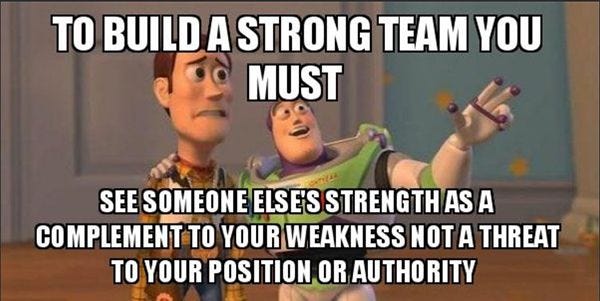If there is one framework you should know, it is the Skill-Will matrix.
I love it.
But it’s not so straightforward to use. We worked with Phil to apply it in his team leader position.
…and we discovered how great it is to involve his whole team.
The background:
Phil had a team of 6 people. He had previous team management experience. But he wanted to level up his leadership skill and create more individual plan for each team members.
The Skill-Will Matrix caught his attention. What skills had he in his team?
Have you ever tried to apply a leadership framework in real life? How did it go? This case study shows one recipe you can work with.
Phil’s team exposed
The Skill-Will Matrix is a fun exercise to do. You put down what you know about your team members.
If you are unsure, you have a mystery to solve and learn something new about them. Such as:
Do they like the job?
Are they willing to do more?
What are their aspirations?
What would help them be more satisfied?
What do they need to be successful?
Phil was pretty good at keeping notes about his team. The team was not so large after all. He managed regular bi-weekly one-to-ones.
We put his team into the matrix. Here is what he “worked” with:
It was not looking bad at all. Two newcomers, one underperforming person, two good ones, and one who was there for a job, and that is it.
Easy peasy for Phil.
But hold on. It was a bit more complicated.
The Skill-Will Matrix assumes you have the skills
The Skill-Will Matrix comes from the authors of situational leadership. They said you needed to alter your leadership style based on whom you worked with.
No arguments about it.
You speak differently to different people. No rocket science.
Yet, the matrix represents a leadership challenge. It makes you feel you (need to) have at least four skills as a leader. Can you simultaneously:
Coach
Direct/command
Delegate
Motivate
Leaders should know all of these. Yet, they don’t. They might be good at one or two, but all of it?

Phil considered himself good at directing. He wasn’t sure if he was guiding people well, and delegating enough. The team's motivation was yet another unknown area for him. So, he experimented.
In the past, he worked in teams in which none of these was necessary. It just worked somehow.
So, he suddenly discovered he couldn’t be able to do everything himself. What now? Quickly take a leadership course? Coaching course? Reading a book?
👉 Free Coaching guide for team leaders
No need to panic. Every leadership framework can be bent. There is no need to work harder, but smarter.
The beauty of the Skill-Will is to discover both, what a team is like, and what you are like. What strengths and weaknesses do you have in your team, including you?
Phil was surprised when I told him he had the right skills.
If you don’t have it, find someone who does.
A big leadership failure is an effort to manage everyone yourself. Why would you do that? To burn out? To prove you can do the job?
Every good leader knows this:
“You have people for it.”
If you don’t, hire someone. Let’s take a look at the team again.
Phil said he could direct well. So, instead of spreading himself too thin and trying to please everyone, we developed a plan for how to involve others in building a team.
Always think of yours and their skills together.
Look at each team member:
Direct: Chris
We had an underperforming Chris. Phil took him under his wings. You know the reason. Phil was good at directing, and he could evaluate if Chris made any improvement or not.
No need to have a middleman.
Yes, Phil could have asked Daniela to work with Chris. But she would use a lot of her energy which Phil wanted her to spend on Camilla and Tess.
He figured it would be a better investment of their time. Ultimately, Phil was in charge of the team. If Chris hadn’t been performing, Phil would have needed to fire him.
Delegate: Joe
As the star of the team, Joe was pretty much ready to take on more responsibilities.
The task given was to lead a project of onboarding newcomers into the team. As a resource, he got Daniela who was an ace in teaching others.
Joe jumped on this opportunity. He and Daniela worked closely to come up with frameworks and knowledge management. Joe helped choose projects in which Daniela could teach the basics.
Phil stepped in only as an advisor. For him, it was an interesting delegating experience. He had to let go. That is something every leader needs to learn.
Joe acted as a point of contact for Daniela, Camilla, and Tess. He was overseeing the newcomers’ progress and making sure they were on track.
Delegate: Daniela
Keep reading with a 7-day free trial
Subscribe to leadink to keep reading this post and get 7 days of free access to the full post archives.







